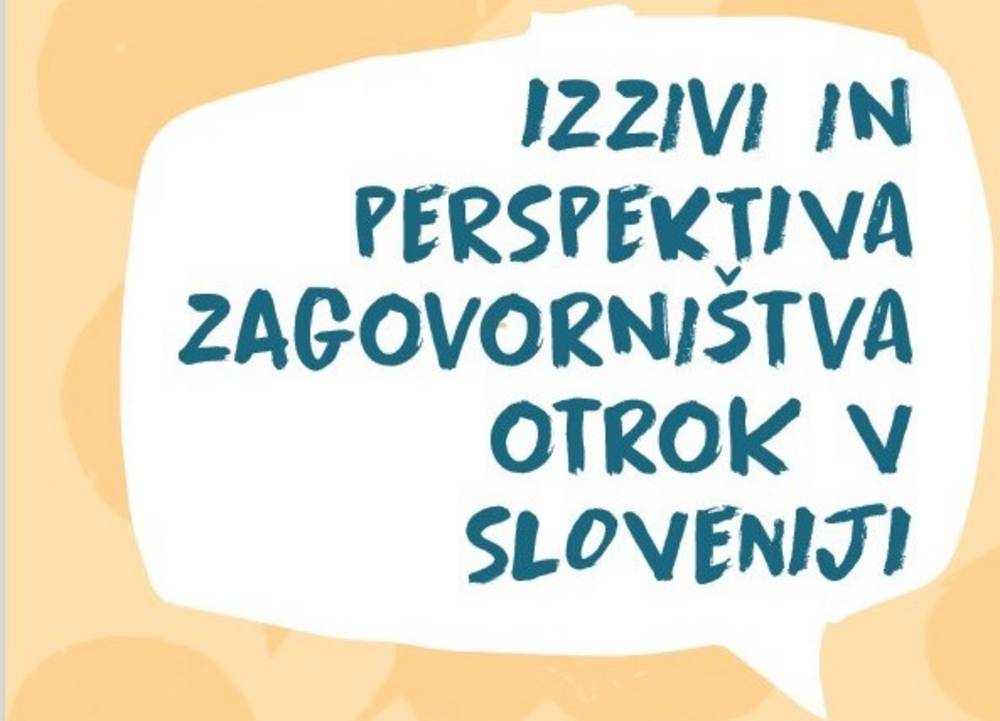The Human Rights Ombudsman (Ombudsman) has recently issued a new publication in the field of child advocacy entitled "Izzivi in perspektiva zagovorništva otrok v Sloveniji" (Challenges and Perspective of Child Advocacy in Slovenia), which is particularly intended for future advocates. The publication is the third one written since the start of the advocacy; both previous ones were published at the time when child advocacy was still a pilot project. All twenty contributions in the publication, which comprises almost 200 pages, represent a valuable learning material for new generations of child advocates.
The procedure of appointing an advocate and the treatment of a child through the prism of various experts are described in detail in the publication, and the reader also obtains guidelines about how to hear a child’s voice in administrative and court proceedings in which their future is being decided on. The emphasis is also on the establishment of a confidential and safe relationship with a child, which represents a foundation for constructive cooperation. The advocates will also benefit from the strategy on working in high-conflict situations in which they frequently find themselves during their work.
"The publication was written during the uncertain times of the coronavirus pandemic which cut deeply into our everyday lives, and the measures to contain its spread had a particularly negative impact on children and adolescents, which was also revealed by a record number of complaints received in this period in the field of advocacy. Despite the fact that we were socially isolated for several months at a time during the last two years, no advocate cancelled a meeting for fear of infection or any other reason, which says a lot about their noble work, dedication and the mission they perform. The sixty advocates working within the institution of the Child Advocacy are well aware that children are the most vulnerable part of society, the least capable of ensuring their own welfare and at the highest risk of abuse. So far, the advocates have been assigned to more than 900 children, which clearly shows that such an institution is necessary in Slovenia," highlighted Ombudsman Svetina.
The Child Advocacy, an institution with its base in the Human Rights Ombudsman Act since 2017, is, similarly to other measures for the protection of children’s rights and benefits, being greatly tested with regard to its efficiency. "Nicely written provision in an act is of little use if those responsible for it fail to implement it in practice. The Ombudsman’s colleagues specifically determine that we still do not do everything necessary for the suitable protection of children’s rights in practice. We fail to consider their opinions, desires and interests sufficiently, and decide on their interests on an inadequate basis," emphasised Ombudsman Svetina.
He also believes that the network of advocates is well-organised in Slovenia in regard to their accessibility, but he wishes to see a more even distribution of initiatives across geographic areas, as too few children are assigned an advocate although entitled to one. The purpose of advocacy is to provide professional assistance to a child in expressing their opinion in all proceedings and matters involving them, and to forward the child’s opinion to those competent authorities and institutions which decide on the child’s rights and best interests. Deputy Ombudsman, Dr Jože Ruparčič, added that the Ombudsman is familiar with situations when a child is caught in a crossfire. "The children engaged in court proceedings regarding high-conflict divorces, reassignment into custody to another parent or changes in contacts with parents, removal from the family and placement in an institution or foster care, neglect, violence and endangerment are the ones most frequently involved in the advocacy." As per the United Nations Convention on the Rights of the Child, Dr Ruparčič stated that Slovenia is striving for the child’s voice to be heard by those who decide on their future, i.e. courts, social work centres and other authorities, as such decisions have an important impact on their future lives. "Unfortunately, we determine that practice varies considerably between institutions, although that should not be the case, and we have been regularly pointing that out in the Ombudsman’s annual reports," highlighted Deputy Ombudsman Ruparčič.

![[Translate to English:] Zbornik zagovorništvo](/fileadmin/_processed_/2/0/csm_zbornik_zagovornistvo_obrezana_N_e2728a00b0.jpg)